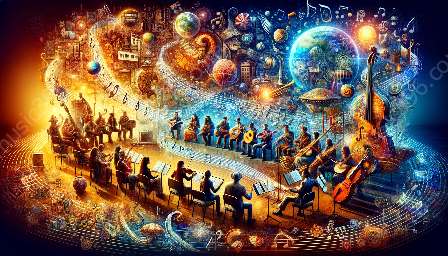Music education plays a pivotal role in addressing issues of accessibility and equity within the framework of culture and society. This comprehensive topic cluster explores the multifaceted ways in which music education contributes to inclusivity, diversity, and equity, while simultaneously shaping and being shaped by culture and society as a whole.
The Impact of Music on Culture and Society
Before delving into how music education addresses accessibility and equity, it's essential to understand the profound impact of music on culture and society. Music has been an integral part of human civilization for centuries, transcending geographical and cultural boundaries, and contributing to the formation of collective identity, values, and traditions. It serves as a powerful medium for expressing emotions, narratives, and experiences, making it an essential component of cultural heritage.
Music Education and Inclusivity
Access to music education is a fundamental aspect of ensuring inclusivity and equity in society. In many communities, music education has historically been inaccessible to certain demographic groups due to socioeconomic disparities, geographical isolation, and lack of resources. However, music educators and institutions are increasingly recognizing the importance of inclusivity, actively working to bridge these gaps and provide equal opportunities for all individuals to engage with and learn music.
Through inclusive music education initiatives, educators aim to create welcoming and supportive environments that celebrate diversity and embrace students from various cultural backgrounds, abilities, and experiences. By fostering a sense of belonging and empowerment, music education becomes a catalyst for social cohesion and understanding, contributing to a more inclusive and equitable society.
Cultural Diversity in Music Education
One of the most significant contributions of music education to cultural equity is the promotion of diversity and representation within the curriculum. By incorporating music from various cultures, traditions, and genres, music education enriches students' understanding of global diversity, fostering respect for different cultural practices and perspectives.
Through exposure to a wide array of musical styles and traditions, students gain valuable insights into the cultural contexts and historical significance of different musical expressions. This not only expands their musical repertoire but also broadens their cultural awareness and empathy, contributing to a more culturally rich and interconnected society. It also supports the preservation of traditional music and heritage, ensuring that diverse voices and narratives are upheld and celebrated within educational settings.
Equitable Access to Musical Resources
While the inclusivity of music education is crucial, ensuring equitable access to musical resources and facilities is equally significant. Many communities and schools face challenges in providing adequate resources for music education, such as instruments, technology, and professional instruction. This lack of resources disproportionately affects marginalized communities, hindering their ability to fully engage with and benefit from music education.
Addressing these disparities requires concerted efforts to advocate for increased funding, infrastructure, and support for music programs, particularly in underserved areas. By promoting equitable access to musical resources, music education can empower individuals from all backgrounds to pursue their passion for music and develop their artistic potential, ultimately fostering a more equitable and culturally enriched society.
Music as a Tool for Social Change
Beyond its educational implications, music serves as a potent tool for driving social change and addressing systemic inequities. Through music education, individuals are empowered to express their experiences, challenge injustice, and advocate for positive social transformation. By nurturing creativity, critical thinking, and collaborative skills, music education equips students with the means to engage in meaningful dialogue, foster empathy, and address culturally relevant issues.
Moreover, music has the capacity to resonate deeply with people, transcending language barriers and unifying diverse communities through shared experiences and aspirations. As music education cultivates a sense of agency and cultural awareness, it amplifies the potential for positive social impact and advocacy, contributing to the advancement of equity and justice within society.
Conclusion
Music education stands as a pillar in the pursuit of accessibility and equity, leveraging the transformative power of music to cultivate inclusive learning environments and foster cultural diversity. By embracing inclusivity, promoting cultural representation, advocating for equitable resources, and harnessing music as a catalyst for social change, music education not only enriches individuals' lives but also contributes to the advancement of a more diverse, equitable, and harmonious society.
In summary, the intersection of music education and culture embodies a collective commitment to nurturing the potential of every individual, regardless of their background or circumstances. As music continues to weave its way through the fabric of society, music education remains instrumental in shaping a world where accessibility and equity are not just ideals but lived realities.






















